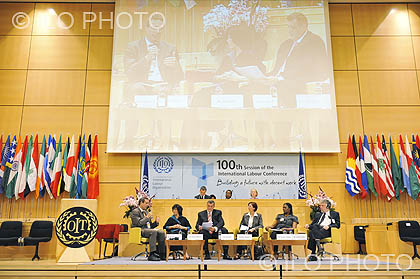Structural Changes and New Production Patterns Are Vital for Sustainable Growth with Equality
Work area(s)
Deputy Executive Secretary of ECLAC, Antonio Prado, gave a presentation in a high-level panel held as part of the annual conference of ILO.

(15 June 2011) The most senior officials of the five United Nations regional commissions met on Tuesday in Geneva as part of a high-level panel, in order to analyse the importance of decent work in the context of greener and more sustainable globalization.
The meeting was held as part of the 100th Session of the International Labour Conference of the International Labour Organization (ILO), in response to an invitation made by the ILO Director-General, Juan Somavía, in January at the ECLAC headquarters during the first 2011 coordination meeting for heads of the UN regional commissions, a group that is currently chaired by Alicia Bárcena, Executive Secretary of ECLAC.
The meeting was attended by Noeleen Heyzer, Executive Secretary of the Economic and Social Commission for Asia and the Pacific (ESCAP), Jennifer Kargbo, Deputy Executive Secretary of the Economic Commission for Africa (ECA), Rima Khalaf, Executive Secretary of the Economic and Social Commission for Western Asia (ESCWA), Jan Kubiš, Executive Secretary of the Economic Commission for Europe (ECE), and Antonio Prado, Deputy Executive Secretary of the Economic Commission for Latin America and the Caribbean (ECLAC).
In his presentation, Antonio Prado emphasized the need to implement structural changes and new production patterns in order to generate sustainable growth with equality, particularly in Latin America and the Caribbean.
As stated in the ECLAC document Time for equality: closing gaps, opening trails, he said that institutions must be built and strengthened to promote and reinforce virtuous circles between productivity growth and the generation of quality employment.
"It is only if workers have access to decent jobs with rights that specific growth patterns will be socially sustainable", he maintained. "The region's countries in particular have great potential to generate green jobs if they manage to develop and consolidate new production sectors", he added.
He also declared that it is crucial to reach agreement so that developed countries may meet their commitment to financial aid and technology transfer, so as to encourage sustainable development and tackle the challenges of a new low-carbon world economy, in accordance with Principle 9 of the 1992 Rio Declaration on Environment and Development.
Participants of the high-level panel exchanged views on the globalization model that has prevailed over the past 30 years - one that has promoted economic growth while also increasing income inequality within countries, failing to control high levels of informal employment and pushing up youth unemployment and underemployment in many world regions.
The Deputy Executive Secretary of ECLAC highlighted that increased global macroeconomic coordination was needed to prevent the shocks that produce high economic volatility and the resulting social repercussions.
Any queries should be addressed to the ECLAC Public Information and Web Services Section. E-mail: dpisantiago@cepal.org; Tel.: (56 2) 210 2040.
Follow us on: Twitter , Facebook , Flickr and YouTube.
Related content
High Level Segment, Panel 3, of the 100th Session of the International Labour Conference (ILO)
By Antonio Prado, ECLAC Deputy Executive Secretary
Country(ies)
- Latin America and the Caribbean
-
Switzerland
Contact
Public Information Unit
- prensa@cepal.org
- (56 2) 2210 2040